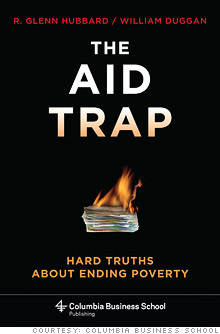Africa's new apartheid
The continent is doing a booming business selling diamonds, oil and coffee to China, but is it benefiting Africans? Economist Glenn Hubbard weighs in.
 |
| Hubbard: "The new apartheid calls for a new movement against it. Who will lead the way?" |

NEW YORK (Fortune) -- There's an irony afoot on the African continent. After years of state control of their economies, African governments are opening up to foreign business as never before.
Foreign companies are lining up to pump African oil, dig African minerals, build and run African ports, export African coffee and cocoa. But what about local companies? The World Bank's latest "Doing Business" report tells a very sad tale.
Let's take Angola. It has diamonds, oil and coffee. These commodities boomed over the past decade, and the government gave licenses to foreign companies to produce and export them.
These days, that includes the Chinese: Angola is now China's biggest African trading partner. China is also building infrastructure for the Angolan government using everything Chinese, including labor and cement. There are far more foreigners in Angola now -- European and Asian -- than there ever were in colonial times.
But what about local Angolan business? According to "Doing Business", Angola ranks now 169 out of 183 countries around the world. That means that the Angolan government essentially does not allow its own people to start and run their own businesses.
This restriction makes for a new kind of apartheid: the business community of Angola is European and Asian, not African. That might not be the intent, but it certainly is the result.
The same is true in country after country of sub-Saharan Africa. But not everywhere. Rwanda stands out as a positive model: it went from 143 on the list in 2009 to 67 in 2010. After years climbing the list, Mauritius now ranks 17.
These two countries show that it is possible for African governments to free their people to start and run their own businesses, and overcome the de facto apartheid that has spread through the African business sector.
China's role in this new apartheid is especially ironic. Twenty years ago Deng Xiao Ping freed the Chinese people to start and run their own businesses, for a very simple reason. He and his fellow leaders had become Communists fifty years before because they genuinely believed it would bring greater prosperity to their people, but over the decades it became obvious that wasn't true.
Just across the border, Korea was a clear example: the Communist North remained poor, and the pro-business South prospered. So Deng Xiao Ping switched. Today, 80% of China's employment and 60% of its GDP comes from local small and medium businesses, which barely existed twenty years ago,
In the old days, Communist China claimed solidarity with Third World peoples -- but what about today? As most countries of the Third World suppress their local business sectors, especially in Africa, China just goes right along.
Chinese leaders will argue that they do so to respect the sovereignty of national governments: if Angola wants to suppress the local Angolan business sector, China has no right to make them change.
But how is that different from South Africa under apartheid? In those days, the South African government put up enormous obstacles to prevent black Africans from starting and owning their own businesses. China joined the rest of the world in condemning South African apartheid, and rightly so. But today, China joins the rest of the world in turning a blind eye to the ongoing apartheid of the local business sector throughout most of Sub-Saharan Africa.
But of course, the western powers are no better than China. They continue to lavish foreign aid on countries that suppress their local business sectors.
There is a collective amnesia among prosperous countries about how they themselves rose from poverty: their local business sectors. They have forgotten their liberal roots -- the term "liberal" first referred to pro-business Europeans struggling against feudal "conservatives."
China and the western powers today are only half-liberal: they foster their own domestic business sectors but tolerate the suppression of the domestic business sectors in the poor countries of the world.
There is an alternative, but it requires political will and leadership among China and other prosperous countries. They can redirect their foreign aid to help foster the local business sector in poor countries.
And there's a powerful precedent: the Marshall Plan of post-war Europe. It made loans to local European businesses, which repaid them to their governments, which used the money for commercial infrastructure like ports and railways. That same model can work today.
Two decades ago, outside pressure helped overturn apartheid in South Africa. Tomorrow, outside pressure can help overturn business apartheid in most of Sub-Saharan Africa. It's time for worldwide solidarity with the struggling local businesses in poor countries around the world. The new apartheid calls for a new movement against it. Who will lead the way?
--Glenn Hubbard, a former chairman of the U.S. Council of Economic Advisers, is co-author, along with Bill Duggan, of a new book, Aid Trap -- Hard Truths About Ending Poverty. He is also dean of Columbia Business School. ![]()
-
 The retail giant tops the Fortune 500 for the second year in a row. Who else made the list? More
The retail giant tops the Fortune 500 for the second year in a row. Who else made the list? More -
 This group of companies is all about social networking to connect with their customers. More
This group of companies is all about social networking to connect with their customers. More -
 The fight over the cholesterol medication is keeping a generic version from hitting the market. More
The fight over the cholesterol medication is keeping a generic version from hitting the market. More -
 Bin Laden may be dead, but the terrorist group he led doesn't need his money. More
Bin Laden may be dead, but the terrorist group he led doesn't need his money. More -
 U.S. real estate might be a mess, but in other parts of the world, home prices are jumping. More
U.S. real estate might be a mess, but in other parts of the world, home prices are jumping. More -
 Libya's output is a fraction of global production, but it's crucial to the nation's economy. More
Libya's output is a fraction of global production, but it's crucial to the nation's economy. More -
 Once rates start to rise, things could get ugly fast for our neighbors to the north. More
Once rates start to rise, things could get ugly fast for our neighbors to the north. More









